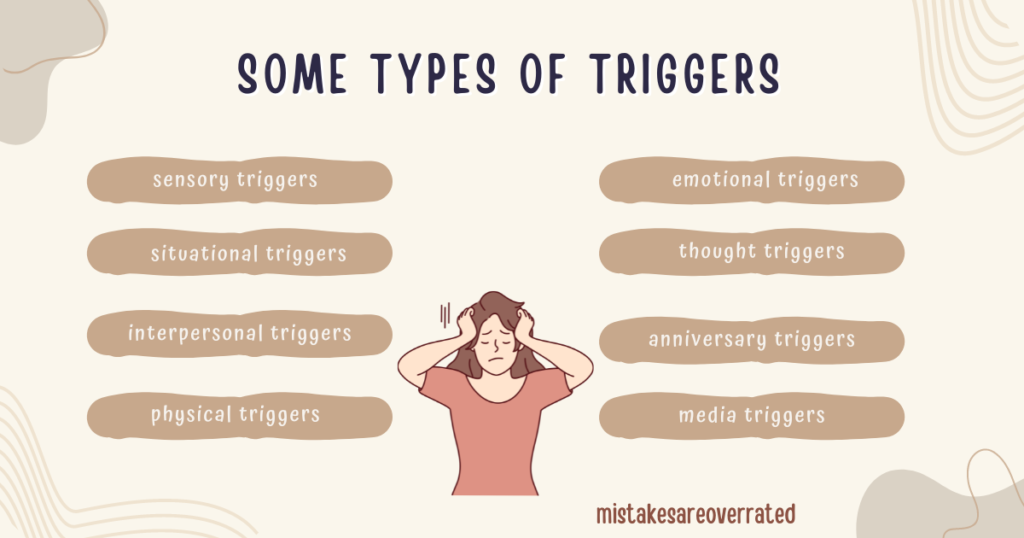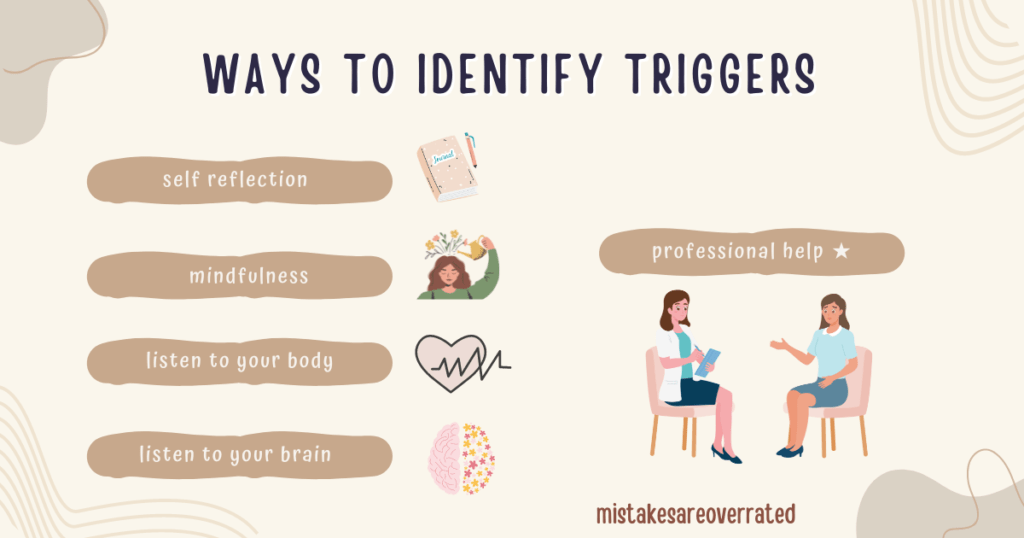why do we get triggered?
triggers can be so intense at times that they can begin to affect our relationships, disrupt our daily life and our overall wellbeing.
learn the insights and strategies i used to manage my triggers and not let them control me, so you can implement them into your journey.
it is so important to understand and manage your triggers, as it increases your self awareness and is a key part in your heal process.
a trigger
a trigger is essentially a stimulant that evokes a reaction.
– something happens that causes an intense uncomfortable or unwanted emotional reaction, usually remembering something bad from our past.
sometimes these re-experiences can be so strong that it feels as though it is occurring in the present time all over again.
to be triggered means you’re experiencing a strong negative emotional response to a situation that is currently disturbing you.
triggers are spilt into internal and external triggers.
however these 2 can correlate with each other when your brain is in the state of being triggered.
types of triggers
internal triggers comes from within a person, either by a sensation, a thought or memory, a feeling or emotion.
it is difficult to control internal triggers at first, as you may not be able to control how you feel or the thoughts that pop into your head.
however, with practise, effort and consistency, you can learn to manage and control internal triggers.
external triggers come from the environment the person is in.
it can vary from (but not be limited to), a place, a person, a specific situation or senses such as smell or touch.
an external trigger could be a certain sound or a particular smell that reminds you of an experience.
it could be a film that depicts similar experiences or visiting a location that brings back traumatic memories.
triggers can bring out emotions that associate with fear, anger, humiliation, numbness, confusion, anger (and a lot more).
with feeling threatened or unsafe, you may begin to panic and try to escape and get away from the situation.
this is seen in different ways for people, as everyone’s situation is different.
some people may become defensive and act out, whilst someone may start to cry and become silent.

how trauma affects the brain
your amygdala is a small portion of your brain yet holds a big job.
it is primarily involved in the processing of memories and emotions associated with fear.
it also links your emotions to memories, so when someone experiences a stressful event, the amygdala sends a distress signal to the hypothalamus.
the hypothalamus is involved in the expression of your emotions – heart rate, blood pressure, body temperature, ect.
conscious memory involves intentional retrieval of a memory.
meaning you can actively recall these experiences and information regarding the memories.
this is done through the process of encoding, storage, and retrieval.
unconscious memories is the brains way of encoding and storing previous experiences, that typically involves less awareness.
unconscious memories can stay hidden away from our conscious mind, yet they can still be retrieved when fear and stress is heightened.
this activates the amygdala which intensifies and reinforces the traumatic memory (as for why it can feel as if you’re reliving the experience).
unconscious memories can be retrieved automatically (being triggered) and this comes across quite suddenly.
when this part of our brain senses danger, it signals stress hormones to pump around to prepare your body to either flee for safety or fight for survival.
unconscious memories play a key role in influencing your behaviour. they can shape your values, preferences, reactions, fears, who we trust, ect.
my unconscious memories after my traumatic experience shaped almost everything about me.
– my values, opinions, preferences, fears, my friend group, my routines, my career, my boundaries, the way i dressed and spoke (too many to list)
and during the time, i wasn’t even consciously aware of this change.
why triggers happen
i haven’t been able to find a researcher that has confidently been able to identify why or how the brain forms triggers.
however, the brain stores traumatic memories differently than it stores non-traumatic memories.
when we experience trauma, our brains put the surrounding sensory stimuli to the specific memory.
that is why when we encounter the sensory triggers after our trauma, our brain may bring back the feelings associated with the trauma.
as traumatic events are often kept outside of the conscious memory, sometimes we may not be conscious of why we’re feeling upset or afraid.
identifying triggers
you need to identify your triggers before you begin to find strategies that help you cope with your triggers.
it is so unfair how usually we aren’t the ones that caused these traumatic memories, yet we’re the ones that live with them, have to learn and teach ourselves how to help our reactions.
remember that everyone is different, so your triggers, the intensity of them, the severity and how often they happen are all unique to you.
here are things i did that enabled me to identify my triggers;

self reflection
if i had to put it down to the main thing i believe that helped me heal the most, it would be journaling.
at first i wrote down whenever i had intense triggers, emotions or reactions.
i wrote down what happened, what i was doing before it happened, how i felt before, during and after, and anything that really stood out to me.
after a few months of doing this, i fell inlove with creating poems.
i expressed my trauma and the feelings i had associated to them within my poetry. (oh and i loved my daily gratitude).
mindfulness
i know what you may be thinking, “i don’t want to meditate or do yoga“, that is precisely what i thought at the beginning of my journey.
however, mindfulness is far from that. it is just simply being.
being 100% present in the moment, gaining self awareness to the thoughts and feelings in your mind and just letting them be.
of course mediation helps to increase the awareness you have with your thoughts and feelings, but it isn’t a necessity.
i practised this whilst watching the sunset. by doing so, i was able to recognise situations and patterns that set off or provoked my triggers.
listen to your body
listening and paying close attention to your physical sensations can help you when learning to identify what your triggers are.
i took notice of when my heart rate increased, when my lip began to shake, when my palms began to sweat, when my breathes became shallow
– these were the things i identified that indicated a trigger was rising in me.
your sensations will be different, but this is why you journal what you feel when you were triggered.
by doing so you will be able to see what sensations that arise in you.
being 100% present (mindfulness), you can feel these sensations rising, as you’re listening to your body,
this makes it easier to be able to link your triggers to certain situations (the stimuli).
listen to your brain
just like how you listen to your physical sensations, also pay attention to your emotional responses / sensations.
by identifying recurring emotional responses you’re able to pick up on the patterns and certain situations when you triggers happen.
these can be feelings in particular environments, such as anger, anxiety or feeling uncomfortable.
with understanding your emotional sensations, you may be able to pick up on what may signal a trigger in you.
professional help
i highly advise you to seek professional help from a trained mental health or health professional
– a psychologist, psychiatrist, therapist or any trained professional of that sorts.
as i have said, all of this information and strategies i am providing you with today is purely from personal experience.
i am not a professional and the contents in this article are solely for general and informational purposes, it should never constitute professional advice and should not be relied upon as such.
i began to see a psychologist 2 years after my traumatic experience, as i found deep trauma wounds i couldn’t help myself heal and needed professional help.
others support
sometimes, being able to talk about your experiences to someone you fully trust can help you.
it can give you insight from a different perspective and help you recognise certain patterns you may not have noticed before.
having someone to talk to will let you release what you have been suppressing or holding in and help you find ways that can help you.
however, you still need to put in the personal self work to understand your feelings and coping mechanisms to find strategies that will work for you.
i found i was able to release my thoughts by journaling when i was too scared to speak to anyone.
but please talk to the police or someone who can help you legally if you have been through trauma of that sort.
strategies for managing triggers
you have to be open to trying new ways through trial and error.
this way you can find what helps you the most and makes you feel the best.
at the end of the day, you’re the one that knows and feels your emotions best – so keep trying new ways if something doesn’t quite work for you.
things that helped me were;

in the moment of a trigger –
a trigger can happen very suddenly, and this can cause us to feel anxious, overwhelmed and/or powerless.
a technique that i found really powerful in bringing myself back into present time was diaphragm breathing.
these are deep, controlled breaths, (instead of breathing in and out with your chest, try to do it low in your tummy).
if i was alone and was triggered i would squeeze my eyes shut to really focus on my breathing.
if i was in public, then i would do my diaphragm breathing whilst focusing on my 3 senses.
find the amount of time to breathe in, hold and breathe out that helps regulate your body and calm you the most (for me it was 5-5-5).
practise mindfulness:
to properly understand and get the full benefits of mindfulness it took me almost a year of consistently practising it.
however a year of practise is nothing compared to the benefits i found from it.
mindfulness allows us to become aware of our thoughts, emotions and feelings.
it also enables us to observe them logically, without any judgment.
mindfulness helped me understand myself on a deeper level that i didn’t think was possible.
everyday i am grateful i continued to try and didn’t give up.
‘healthy’ coping mechanisms:
make sure the activities you engage in are promoting and increasing your overall well-being.
such as – creative expression (art, dance, affirmations, journaling, poems, singing, ect), exercise, sport, or spending time with supportive people.
by engaging in these activities you’re acknowledging your trauma instead of avoiding it.
this can help decrease suppression, repression and escapism from your trauma (these are considered ‘unhealthy’ coping mechanisms).
acknowledging trauma can allow us to be able to understand, work through and help heal our trauma.
mindset switch:
what i mean by this is challenge your negative thoughts associated with your triggers and and switch them.
try to replace the negative thoughts with more balanced, positive thoughts.
this switch in my mindset helped me reassure myself that i was safe, aswell as the harmful self talk i used to say.
grounding yourself:
grounding exercises such as deep breathing, focusing on your surroundings, or using your 5 senses.
this helps bring us back into the present moment, which is especially important when feeling overwhelmed or having flashbacks.
emotional regulation:
these are techniques that allow you to learn how to manage your emotional responses.
these can be activities or places that bring you joy or peace, journaling, self-soothing, better sleep, exercise, practising self compassion.
professional help:
please consider seeking help from a trained professional as they can provide professional strategies and guidance.
self compassion:
understand that healing is a journey.
you need to be kind, patient and caring to yourself.
when you know you are on your side in life you’re able to acknowledge your feelings and emotions without any criticism or judgement.
please be kind to yourself whenever you experience a trigger, as learning about yourself in your journey.
your inner voice is very powerful, so talk to yourself how you would to the closest person in your life going through a hard time.
keeping track:
keep track of your emotional responses, physical responses and triggers, as this can help you identify any patterns.
when you understand your patterns, it can help you prepare and/or manage future reactions that little bit smoother.
this can be a journal, a mood tracker, on your phone – literally anything.
having a visualisation to look can help pick up on any patterns, certain times, people, words, experiences, ect, that may trigger you.
personal experience
i found journaling and creative expression helped me the most with overall triggers.
for me it was writing poems, training and playing my sport, coastal walks, camping and surrounding myself with kind hearted supportive people.
i really struggled to trust people after my traumatic experience, so if you are struggling too, i have an article on gaining trust after trauma.
when i experienced external triggers i found having a full conversation to myself in my head helped me immensely.
it might sound crazy, but i would speak to myself mentally to reassure myself and calm me down.
telling myself things like “i’m okay. i’m safe. it’s alright”.
i mainly used 3 of senses – i would look around the environment i was in, hyper-focus on the sounds around me and touch a few things.
the mixture of these things made my brain focus on my subconscious voice and less on the trigger.
but it also reassured me that i had acknowledged i am in a triggered response and i was trying to manage it.
then i could calm myself down through my breathing techniques
breathe in 1,2,3,4,5, hold, breathe out 1,2,3,4,5 – i continued until my heart rate was slowed and my thoughts were steadied.
it took me 13 months to be able to manage my triggers through a lot of trial and error.
in fact i used to remove myself from whatever situation i was in when i first began to experience triggers.
i would isolate myself from the external trigger or the people i was with to sit and cry by myself until i was okay, (this took up to an hour at time).
what i have learnt / best tips
remember that your body is using this mechanism to try and protect you from feeling the way you did in your traumatic experience/s.
as draining and frustrating it is that we have to live with these triggers, we have to be thankful in some way that our body is just doing its job with protecting us.
it is possible for you to understand what calms your bodies responses over time with effort, patience, kindness and persistence.
but when you find solutions that help you control these external and internal triggers, you will forever thank yourself.
your resilience and effort to learn about your body and triggers is admirable.
i wish you all the best on your healing journey, and just know i have your back ❤
please feel free to share your thoughts and experiences if you feel comfortable to do so below
if you have a specific topic you want to read about, please reach out to me so i can look into it for future articles.
-MAO
don’t give trauma the power to control you, you deserve to live how you want. take control of your trauma.
-life advice from one survivor to another
you are so strong.

Leave a Reply